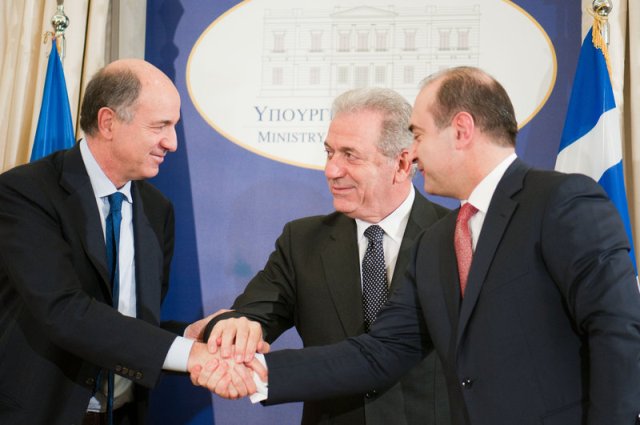ATHENS – Italy, Greece and Albania signed on Wednesday an agreement backing a plan to build the Trans-Adriatic Pipeline, part of a larger project aimed at transporting natural gas from Azerbaijan to European markets.
Even so, the success of that tri-national accord will depend on whether Azerbaijani authorities and the companies involved in developing gas reserves in the Caspian Basin opt for the TAP or one of the proposed alternatives.
The deal was signed by Greek Foreign Minister Dimitris Avramopoulos, Albanian Deputy Premier Edmond Haxhinasto and Italian Economic Development Minister Corrado Passera.
Also present at the ceremony were Greek Prime Minister Antonis Samaras and U.S. Deputy Assistant Secretary in the Bureau of European and Eurasian Affairs Eric Rubin.
The plan was proposed by an international consortium made up of Swiss energy company EGL (42.5 percent), Norway’s Statoil (42.5 percent) and Germany’s E.ON Ruhrgas (15 percent).
If selected, the TAP would be built at a cost of 1.5 billion euros ($2 billion) and create roughly 2,000 jobs, Samaras said.
The gas pipeline would initially transport some 10 billion cubic meters (352 billion cubic feet) of natural gas per year and stretch for 520 kilometers (323 miles) from southern Italy to the Greek-Turkish border.
The conduit would link up with the proposed Trans-Anatolia gas pipeline, announced last fall by the Azerbaijani and Turkish governments.
That latter pipeline would traverse Turkey from east to west and could connect with the existing South Caucasus pipeline that links the Shah Deniz gas field in the Azerbaijan sector of the Caspian Sea with Turkey via Georgia.
The TAP has been proposed within the context of stiff competition among European countries and companies in the wake of the EU’s declared strategy to reduce its dependence on Russian natural gas. EFE
